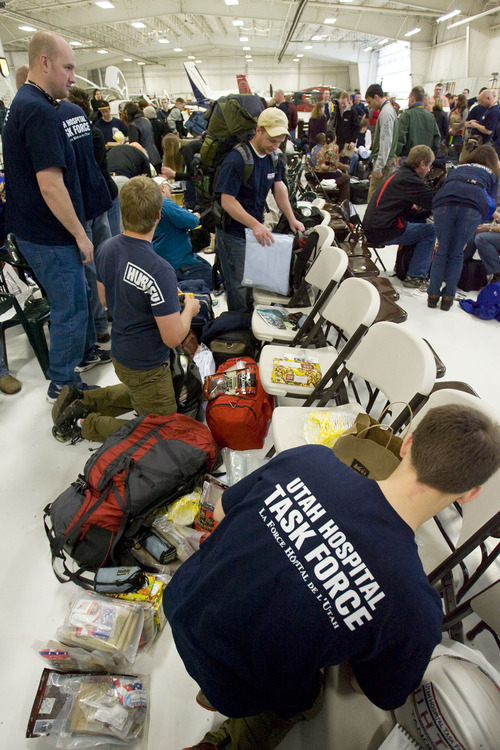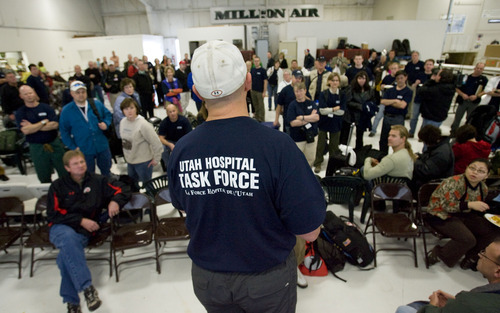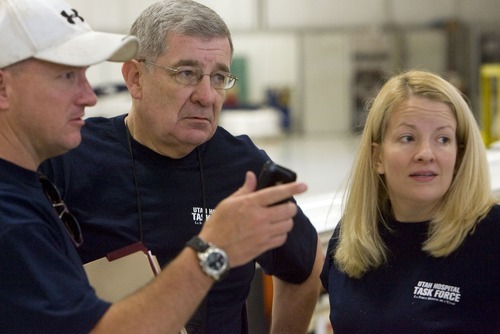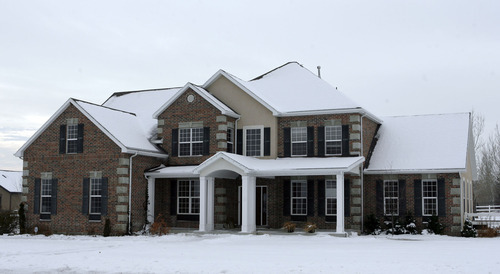This is an archived article that was published on sltrib.com in 2011, and information in the article may be outdated. It is provided only for personal research purposes and may not be reprinted.
Last spring, fresh from pulling off a hastily organized relief mission to earthquake-devastated Haiti, Stephen Studdert announced ambitious plans to build the American Hospital of Haiti. "We're well on our way to opening next January in time for the quake's first anniversary," he told The Salt Lake Tribune.
But behind the scenes, the self-described philanthropist was being hounded by creditors: investors in a failed technology startup; mortgage lenders who in December agreed to a short sale of his Alpine home; and John A. Nichols, a friend and neighbor who fronted Studdert $240,000 for his first mission to Haiti.
Undaunted, Studdert persisted with plans for the hospital, raising money through Americans Helping Haiti — until last week when the nonprofit folded.
For Haiti, the charity's demise is another disappointment in a turbulent year of recovery. What it means for Studdert and his creditors is unclear.
"I'm not sure he has the money to repay me," said Nichols, who sued Studdert in October. "I just want to prevent someone else from being hurt. Maybe if someone does a web search under his name, they'll think twice before giving him money."
Studdert, 63, has not responded in recent months to repeated requests for an interview, but friends say he is standing by his word to repay legitimate debts, instead of discharging them through bankruptcy.
—
To the rescue • According to his lawsuit, Nichols was invited by Studdert to be part of what was later billed as the largest non-military response team to Haiti, the Utah Hospital Task Force.
"Here's a man who was two times a stake president and mission president [for The Church of Jesus Christ of Latter-day Saints]. You assume he's a man of integrity," said Nichols, who agreed to handle the logistics of transporting the team of medical personnel and translators overseas.
Said Nichols' wife, Catia, "I was afraid for him to go to Haiti, but reasoned if it's good for other children of God, then he should go."
Days before the team was scheduled to leave on a chartered airplane, Studdert told Nichols that despite large sums of money donated to the effort — including $50,000 in uncleared checks and half-a-million from a single donor — he did not have sufficient cash to pay for the flight.
Nichols offered to loan him $150,000. The deal was sealed with a handshake and, according to the lawsuit, assurances from Studdert that Nichols would be repaid. Later, Nichols fronted another $90,000 for a return charter after plans to fly volunteers home on U.S. military and Delta flights crumbled.
"Rather than having 120 doctors and nurses stranded in Haiti and us being on CNN, I wired the money," said Nichols. To date, he has been reimbursed $50,000, he said.
—
Money and promises • Studdert remains in Utah and is now involved with an Orem-based company that has federal approval to help foreign entrepreneurs invest in Utah businesses in exchange for work visas and eventually U.S. citizenship. Friends describe him as a "visionary."
"Steve is the kind of guy who can put a group of people around a table and say, 'Teach us how to build a hospital,' " said Thomas Murdock, a longtime friend and treasurer for Americans Helping Haiti.
An advance man for three U.S. presidents, Studdert orchestrated George Herbert Walker Bush's inauguration. He chaired Utah's Centennial Commission, served a stint as president of the small College of Southern Virginia, which promotes the standards of the LDS Church, and with his sons has run venture capital and political consulting groups.
But Nichols is not the first to accuse Studdert of making big promises to draw money, then not following through on repayment.
He was an executive officer for Draper-based Fonix Corp., a voice-recognition technology company, when its stockholders sued over a deal that allegedly benefitted management over stockholders. The suit was eventually settled out of court.
And for the past two years, he's been exchanging legal blows with partners in a failed start-up. Time Critical Solutions, LLC was supposed to manufacture miniaturized communications technology for the military. But it never got off the ground.
Studdert was the money guy, financing the company through his venture capital firm, Mantford Ventures. He claims in a lawsuit that employees of the company quit and ran off with the technology, which they then sold to another company in Delaware, ACOMM Inc.
But the employees deny selling the technology and in a countersuit are seeking damages, claiming the funding never materialized.
"They're the ones who were hurt. They all left jobs on Studdert's promises that he would finance this. But there was no funding for development of anything, not even for lab space or office space," said their lawyer, Steve McMurray in Salt Lake City.
Meanwhile, two Utahns are suing Studdert to recoup money they loaned him for the venture. Jose Valle and Elizabeth Anderson have separate judgments against Studdert and other defendants for a combined $81,000.
Studdert was supposed to appear at a state court hearing in Provo last Friday, where Valle's lawyer, Nelson T. Abbott, was hoping to discover "what assets and property he has." But he didn't show.
"We've had trouble getting him served," said Abbott. "Good people can have their businesses go belly up, but he was pretty sloppy. … To raise money, you have to prove you have credited investors and you have to give certain disclosures. My client got very little information about the business he invested in."
Studdert's lawyer Stephen Quesenberry said Studdert is doing everything he can to get everyone paid.
"Imagine you have a great idea, you get your friends and business associates to invest in it, and then your employees run off with the idea … and leave [you] holding the bag," he said.
—
New charity fizzles • Abbott acknowledges that Studdert made four $1,000 payments to Valle between May and August 2010 — about the same time Studdert was building what he hoped would be a $10 million to $20 million endowment for his Haiti hospital.
Studdert kicked off fundraising at a dinner banquet headlined by Mormon apostle Elder M. Russell Ballard and attended by Utah Gov. Gary Herbert. He organized a bike race in Heber and planned a "major dance exhibition" in Las Vegas and other events in Boston, New York and Miami. And he launched Million Mothers for Haiti, a social networking scheme to urge women to make small donations of $12.
To date, there has been no full accounting of his charity's finances. The board has only met three times by phone and has never reviewed financial statements, according to one of its members, Douglas E. Bywater, a lawyer in Virginia.
In April, after failed tries to get Studdert to register his charity with the Utah Department of Commerce, the Division of Consumer Protection fined Studdert $500. Murdock paid the fine and filed the required paperwork.
Studdert now claims no affiliation with the charity other than as visionary and volunteer, though its now-defunct website once listed him as CEO and president.
When the nonprofit dissolved, Murdock said any remaining funds will be contributed to "urgent medical needs in Haiti."
Murdock denies ever promising to repay Nichols. Still, half of the $106,000 raised for the Utah Hospital Task Force went to Nichols, Murdock said, without detailing how the rest was spent.
The hospital is a venture separate from the trip, explained Murdock. "There's no way we're going to misappropriate money. We're not going to collect money for the hospital and have it wind up paying for a lawsuit."
Nichols recently sold his trade show booth manufacturing business, Nichols Inc., and his family of six is on solid financial footing.
"I don't want sympathy. I'm in a position in life where no one should feel sorry for me. I've been blessed," he said. Had Studdert admitted he didn't have the money, Nichols said, he would have worked with him to find a solution.
"He shouldn't have started the hospital without making good on his other promises," he said.
Tribune reporter Christopher Smart contributed to this report. —
Studdert's mission to Haiti
Under the name Utah Hospital Task Force, Stephen Studdert organized a "rescue and relief" mission to Haiti. The group treated 5,000 patients, performed hundreds of surgeries and aided the emigration of dozens of orphans to adoptive parents in the U.S.









